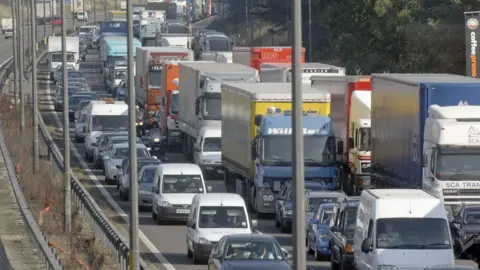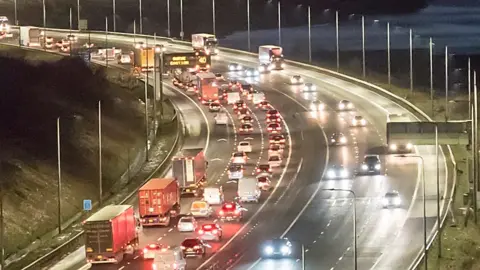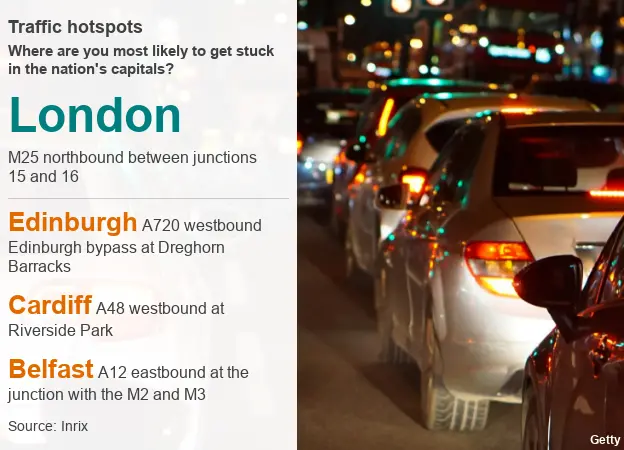'Pay-per-mile' scheme for HGVs considered
 BBC
BBCThe government is considering a "pay-per-mile" scheme for lorries to cover the cost of damage to roads.
Transport Secretary Chris Grayling confirmed the current HGV levy, used to pay for wear and tear on the road network, was being consulted on.
Critics say the current scheme means international drivers using the roads do not have to pay towards upkeep.
But the Road Haulage Association (RHA) said it was unfair to target lorries and it needs to see more detail.
Mr Grayling denied any plans for a road toll system for other vehicles for the "foreseeable future".
Speaking on BBC Radio 4's Today programme, the minister said it was about creating a "level playing field" for British and international hauliers.
"Our hauliers often complain that a continental trucker comes in with a tank full of lower duty diesel, spends several days working in the country, goes away again and pays nothing towards the use of the roads," he said.
"We already have a system in place that provides some limited contribution, but we're now consulting the industry."
But a spokesman for the RHA said he was "worried" about the announcement.
"Although it's good news that more money is being spent on roads, it's not right to target only lorries with a new tax," he said.
"This has to be revenue neutral for lorry firms. If we fail to do this, it will make us less competitive than our European counterparts."
 Getty Images
Getty ImagesThe news came as the government launched a separate consultation to find out which A-roads in England needed cash to bring them up to scratch.
The Department for Transport announced funding in the summer to rejuvenate the road network, but is now asking councils to apply for up to £100m per road.
Priority will go to road widening projects on dual carriageways, improving road safety measure and major junction improvements.
About 5,000 miles of A-roads across the country will be eligible for the multi-billion pound funding pot to improve the nation's strategic road network.
'Build those bypasses'
The consultation will last for 12 weeks, but Mr Grayling said he hoped plans to start development next year and building work to start within three years.
"We've been spending a lot of money recently on the motorways and big dual carriageways," he said. "What we have not been doing is sorting out the next tier down.
"This [consultation] is all about medium-sized towns on those A-roads that have got clogged up centres, that have got lorries waiting at traffic lights, that have got pollution in the centre.
"It's about time we started to build those bypasses, improve those roads, add extra stretches of dual carriageway and focus on the next tier down of roads."

Motorists in the UK drove 324 billion miles in 2016 - up 2.2% on the previous year - but AA spokesman Luke Bosdet said many drivers suffered a "daily nightmare" at notorious pinch points.
As a result, he said improvements to ease traffic flow were "very welcome".
RAC director of motoring Steve Gooding said: "For many businesses an economically important major road is the one that runs right up to the factory gate.
"It will be interesting to see whether the business bodies consider the government's plans to go far enough in designating the roads that matter to their members."
But Bridget Fox, of the Campaign for Better Transport, said the government should focus on improving major transport links, rather than overhauling major road networks.
She said the Department for Transport should apply a "fix it first" strategy to prioritising road maintenance, and improving public transport and cycling routes.
